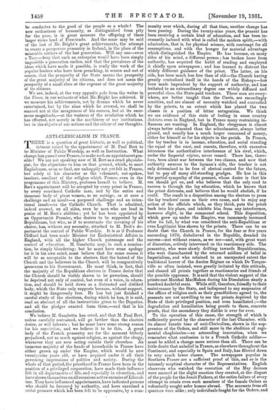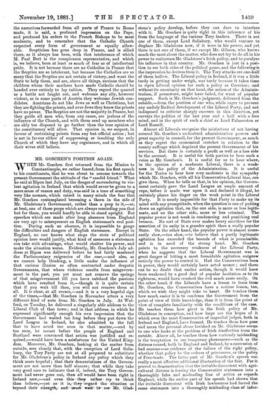ANTI-CLERICALISM IN FRANCE.
THERE is a question of great historic, as well as political, interest raised by the appointment of M. Paul Bert to be Minister of Public Worship, as well as Instruction. What change has passed over France, to make such an appointment pos- sible? We are not speaking now of M. Bert as a cruel physiolo- gist, for the objections to him on that ground, which, to most Englishmen, seem so final, are unhappily not yet felt in France, but solely of his character as the vehement, out-spoken, insolent, assailant of the religion which France, even in the programme of this Ministry, professes herself to believe. M. Bert's appointment will be accepted by every priest in France, by every convinced Catholic man, and by the entire and immense body of pious women, as an outrage, as at once a challenge and an insult—a purposed challenge and an inten- tional insult—to the Catholic Church. That is admitted, indeed avowed, on all sides, even by men who are loud in praise of M. Bert's abilities ; yet he has been appointed by an Opportunist Premier, who desires to be supported by all Republicans, but who, as if to accentuate the meaning of his choice, has, without any necessity, attached to M. Bert's de- partment the control of Public Worship. It is as if Professor Clifford had been made Minister for Ecclesiastical Affairs in England, with all the higher Church patronage and the control of education. M. Gambetta may, in such a nomina- tion, be simply blundering; but he must have some apology for it in his own mind, must believe that for some reason it will be so acceptable to the electors, that the hatred of the Church and the believers in the Church will be comparatively innocuous to his Government. He must think, in fact, that the -majority of the Republican electors in France desire that the Church should be visibly shown to be powerless, should be deprived not only of control, but even of a voice, in educa- tion, and should be held down as a distrusted and disliked body, which the State only supports because, without support, it might be dangerously free. He has but just finished a careful study of the elections, during which he has, it is said, read an abstract of all the instructions given to the Deputies, and all the pledges exacted from them,—and that is his conclusion.
We believe M. Gambetta has erred, and that M. Paul Bert, unless carefully restrained, will go farther than the elect6rs desire, or will tolerate ; but he must have some strong reason for his conviction, and we believe it to be this. A great body of the French peasantry are for the moment bitterly prejudiced, not so much against religion, as against the clergy, whenever they are seen acting outside their churches. An immense majority of the heads of households in France have either grown up under the Empire, which would be now twenty-nine years old, or have acquired under it all their governing impressions of polities and society. During the whole of that period, the priesthood in France have been in the position of a privileged corporation, have made their influence felt in all departments c: life, and especially in education, and have shown themselves on all occasions active enemies of Liberal- ism. They have influenced appointments, have indicated persons who should be favoured by authority, and have exercised a social pressure which has been felt to be oppressive, by a com- munity over which, daring all that time, another change has been passing. During the twenty-nine years, the peasant has been receiving a certain kind of education, and has been in- cessantly imbued with what is called the modern spirit,—with admiration, that is, for physical science, with contempt for all assumptions, and with the hunger for material advantage which distinguished the Empire. He has become, on many sides of his mind, a different person ; has broken loose from authority, has acquired the habit of reading and employed it chiefly upon newspapers ; and has learned to distrust the widely different guidance of the priest. The latter, on his side, has been much less free than of old—the Church having greatly centralised itself in the hands of the Bishops—has been made imprudent by the support of authority, and has irritated to an extraordinary degree one widely diffused and powerful class, the State-paid teachers. These men are every- where, are better taught than the Cures, are exceedingly sensitive, and are almost of necessity watched and controlled by the priests, to an extent which has placed the two classes in a position of bitter antagonism. We think we see evidence of this state of feeling in some country districts even in England, but in France many restraining in- fluences are wanting.' In England, the clergyman is almost always better educated than the schoolmaster, always better placed, and usually has a much larger command of money, either for himself or for his objects in the parish. In France, the lay teacher is in income, education, and social standing the equal of the cure, and resents, therefore, with excessive bitterness the authoritative interference of his rival, which, under the Imperial regime, never ceased. There has, there- fore, been silent war between the two classes, and now that authority swerves to the layman's side, the teacher is not only determined to be free of clerical control for the future, but to pay off many old-standing grudges. He has in this the partial sympathy of the peasant, whose desire is that his son should get on, and who believes that the only road to success is through the lay education, which he knows that the priest distrusts, and believes that he would abolish, if he could. The result is a disposition among the electors to press the lay teachers' cause as their own cause, and to enjoy any action of the officials which, as they think, puts the priest back into his place, and inhibits him from any interference, however slight, in the communal school. This disposition, which grew up under the Empire, was immensely increased after its fall, by what was considered the anti-Republican or even Legitimist bias shown by the priests. There can be no doubt that the Church in France, for the four or five years succeeding 1870, disbelieved in the Republic, dreaded its success—not without reason, as we see—and, with great want of discretion, actively intervened on the reactionary side. The peasantry, who were slowly drifting towards Republicanism, who were disenchanted by the returned soldiers of belief in Imperialism, and who retained to an unexpected extent the traditional horror of the Ancien Regime on which De Tocque- ville so often insisted, were greatly irritated by this attitude, and classed all priests together as reactionaries and friends of the possible oppressor. It is said that the violent support of the priests cost Marshal MacMahon during his Dissolution nearly a hundred doubtful seats. While still, therefore, friendly to their maintenance by the State, and indisposed to any suspension of the offices of religion such as their grandfathers agreed to, the peasants are not unwilling to see the priests deprived by the State of their privileged position, and even humiliated ;—the degradation and humiliation being proofs to them, concrete proofs, that the ascendancy they dislike is over for ever.
To the operation of this cause, the strength of which is sufficiently proved by the character of the last Chamber, with its almost fanatic tone of anti-Clericalism, shown in the sup- pression of the Orders, and still more in the abolition of regi- mental chaplaincies—an astounding innovation, when we remember what confession is to a French Catholic soldier— must be added a change more serious than all. There can be little doubt that unbelief in France, as elsewhere throughout the Continent, and especially in Spain and Italy, has filtered down to very much lower classes. The newspapers popular in Southern France are a sufficient proof of this, and so is the intensely sceptical character of the Representatives. English observers who watched the execution of the May decrees were amazed at the slight emotion they created, at the disgust of the people for the Jesuit Fathers, at the. entire failure of every attempt to retain even such members of the female Orders as voluntarily sought safer homes abroad. The accounts from all quarters were alike ; only individuals fought for the Orders, and
the narratives forwarded from all parts of France to Rome made, it is said, a profound impression on the Pope, and produced his orders to the French Bishops to be most moderate, and to remember that the Catholic Church respected every form of government as equally allow- able. Scepticism has gone deep in France, and is allied there, as it always has been, with that intolerance of which M. Paul Bert is the conspicuous representative, and which is, we believe, born at least as much of fear as of intellectual pride. It is not because there are no Catholics in France that the Sceptics are so intolerant, but because the Catholics are so many that the Sceptics are not certain of victory, and want the State to help them, and are, above all things, anxious that the children whom their mothers have made Catholic should be handed over entirely to lay tuition. They regard the quarrel as a battle not fought out, and welcome any ally, however violent, as in some parts of Austria they welcome Jewish can- didates. Austrians do not like Jews as well as Christians, but they are fighting the priests, and over Jews they know the priests have no power. The Sceptics are not the majority in France, but they guide all men who, from any cause, are jealous of the influence of the Church, and with them send up members who are only too disposed to go farther than the true opinion of the constituency will allow. That opinion is, we suspect, in favour of restraining priests from any but official action ; but is not in favour either of suppressing or insulting the only Church of which they have any cognizance, and in which all their wives still believe.







































 Previous page
Previous page